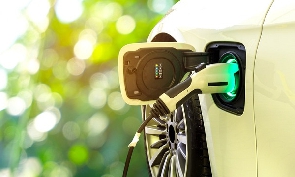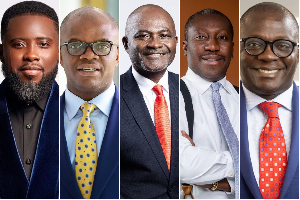James Obeng owns an engine refurbishment shop near Odawna, the heart of Ghana’s capital, Accra.
With no protective gear, he and his apprentice skillfully dismantle engines and take them through meticulous processes, including cleaning and straightening of rough edges, often referred to as overhauling.
“Part of our work is to refurbish ‘dead’ and smoky engines. This is because it is expensive at the car dealership. Engines are not manufactured here in Ghana but at least we have the skills to resurrect it,” he said.
Dotted across garages in the country, the expertise of James and his colleagues, running into several thousands, are highly sought after to repair overage vehicles – 10 years and above. These vehicles can be imported but with penalty charges.
There are millions of James’s on the African continent as well.
For years, they have kept vehicles mostly used and imported from Europe, the Americas, Asia and the Pacific running with their craft.
However, many are feeling uneasy about the sustenance of their source of livelihood as a wind of change from fossil fuel to renewable energy continues to blow in the automobile industry.
As happened some time ago when automatic vehicles were introduced, with most mechanics struggling with their maintenance, the same is likely to happen with the switch to electric vehicles.
Why the switch?
Governments, global automakers, and other stakeholders have agreed to transition to 100 per cent zero-emission sales of new cars by 2035 in “leading markets” and 2040 globally.
This is to reduce pollution from the use of petroleum products, which have contributed to climate change.
It feeds into the Paris Agreement target of countries taking urgent steps to limit global warming to about 1.5 Degrees Celsius.
The International Energy Agency (IEA) is convinced that vehicle electrification is a major means of reducing carbon footprint in the transport sector.
All jurisdictions from where Ghana imports automobiles are transitioning from Internal Combustion Engine (ICE) vehicles, which run on fossil fuel to Electric Vehicles (EVs).
The European Union for instance recently says it will ban new petrol and diesel cars from the year 2035, and that carmakers would only be allowed to sell vehicles with zero carbon dioxide emissions.
In the first quarter of 2023, over 2.3 million electric cars were sold, about 25 per cent more than in the same period last year, according to IEA.
Some 14 million will be in sales by the end of 2023, representing a 35 per cent year-on-year increase with new purchases accelerating in the second half of this year.
Some10 million EVs were sold in 2022, representing 14 per cent of all new cars sold, a rise from around nine per cent in 2021 and less than five per cent in 2020.
China tops with 60, followed by Europe, 15 and the United States 55 per cent in 2022. In the South, and particularly in East and South-East Asia, it is two-wheelers that are leading this electric revolution. Africa is now warming up to join the train.
The United Nations Environment Programme and partners are supporting South Africa and other four countries towards adoption of zero and low emission buses initiative, Ghana and five others are focusing on baseline setting and policy development for the introduction and shift to electric vehicles.
Togo and Kenya and eight others are working on an initiative towards the introduction of electric two and three wheelers.
The case of Ghana
As a signatory to the Paris Agreement, the country recognises that the energy and transportation sectors are key areas in reducing emissions and it is seeking to transition all its road and rail mobility to electric by 2070.
The first electric vehicle baseline study assigned by the Energy Commission, under its Drive Electric Initiative, identifies three types of electric vehicles that are imported into the country.
They are Battery Electric Vehicles (BEVs), Plug-in Hybrid Electric Vehicles (PHEVs) and Hybrid-Electric Vehicles (HEV).
The BEVs are powered solely by an electric battery, with no gas engine parts and most of them are fast-charging and graded zero emissions.
PHEVs have larger batteries, electric motors and have a gas tank while HEV uses an electric motor to assist the gas-powered engine and cannot be charged.
All HEV energy comes from gasoline. The study reports that as of 2021, HEVs had the highest representation of 91.5 per cent followed by BEVs at 5.1 per cent and PHEVs at 3.3 per cent.
The Report flags that the skills for EV servicing, maintenance and repair are in short supply in Ghana.
Only three EV dealerships have functional service facilities and well-trained technicians.
EV’s Preparation
Some industry analysts have described the country’s EV sector as “implementation before planning trend”.
“The policy is not ready, same as the standards and maintenance/service sector, yet there are EVs in the systems,” Mr Bernard Owusu, National Chairman, General Transport Petroleum and Chemical Workers Union of Trade Union Congress, told GNA.
Mr Mohammed Amin Adam, Minister of State at the Ministry of Finance, in a GNA report observes that the shift in global preference from combustible to electric vehicles is a wakeup call for the country to increase the pace of energy transitioning not to pay a hefty price to catch up.
“We ordered buses for Metro Mass Transport last year and when we placed our order, the manufacturing company told us that out of all the orders that they had received, we were the only country ordering combustion vehicles. The rest are ordering for electric”, he says, stressing the need for the country to move to electric vehicles.
Mr Kofi Agyarko, the Director of Renewable Energy, Energy Efficiency and Climate Change at the Energy Commission, says the standards for EVs charging stations are ready.
The next step according to him is for the EC to develop the regulations to make the standard legally enforceable.
However, a number of dealers like iJANU Limited, have shown interest and are actively engaging in that emerging niche with the required personnel and their trained mechanics.
Mr Enam Kulevome, the Operations Coordinator of the Company, tells GNA that the Company’s initial focus was to provide Level three charging stations using solar as a base and the grid as support.
However, the limited number of vehicles in the system motivated them to include the importation of EVs to support the country’s switch to renewable powered vehicles.
The Company has mechanics, who service their vehicles and plan to partner with vocational and training institutions to provide capacity for electrical engineering students to facilitate the transition.
Others like Rana motors and Solar taxi have given indications to bring in more EVs.
Transport Ministry’s reactions
Mr Daniel Essel, Deputy Director, Ministry of Transport, describes the limited skills of mechanics as “stranded asset”.
“It is an issue that has come up during stakeholder consultation and these are some of the issues the policy will address,” he says.
Mr Essel says the draft policy, in which stakeholders are holding regional consultative meetings, will make provision for re-training opportunities for mechanics and artisans to maintain and service EVs.
He acknowledges that re-sale of some types of EVs are difficult, because of limited skills by the garages to be able to service them.
“It is about time we start building the capacity of our mechanics because we do not have a choice because the world is changing and we need to conform,” he adds.
COTVET’s window of opportunity
In the view of Dr Fred Kyei Asamoah, the Director-General for the Commission for Technical and Vocational Education and Training (COTVET), there are opportunities for students, mechanics, and professionals.
He believes that the competency-based training approach curriculum of the technical and vocational sector is robust, dynamic and will produce graduates for the EV maintenance.
“There is a sector skills body that decides the curriculum because they are the up takers of graduates. One is dedicated to auto and conversation has started looking at equipping our learners to service EVs,” he tells GNA.
“Now, the automotive sector skills body is looking at mechatronics and autotronics, which border on EV’s. The investment and reforms by the government in technical and vocational education and training is huge. It has attracted many, resulting in 50,000 plus enrollment in 2023.”
The garages, he says, can be supported under the second phase of 20 million Euro Ghana TVET Voucher Project (GTVP) that provides demand-driven training vouchers to CTVET registered and accredited TVET institutions for master craft persons and their apprentices to attend.
Garages await support
Some owners of garages are aware of the emergence of EVs and their limited capacity to provide services in that space.
Already 17,660 (International Trade Center) of the more than three million vehicles (Ministry of Transport) in the country are EVs.
Mr Johnny Karambilas, the Secretary of Odawna Zone One Garage, recalls that its mother body last year provided an avenue for mechanics willing to upgrade their skills on EVs.
However, many could not sign on to it due to the financial commitments involved.
Mr Francis Nomo Tetteh, National Communications Director of the Ghana National Association of Garages (GNAG), says through the skills development fund, 40 mechanics in Accra will soon be undergoing training on EV servicing.
“Our membership in the country is more than three million and training 40 out of that is woefully inadequate. The number of EVs are rising and our people need to be empowered,” he said.
Their appeal is for vehicle manufacturers in China, Americas, Japan, Korea, and Europe to offer free training for members in Ghana to keep their jobs.
For James and others, although the policy on EVs is being formulated, the pace is slow, and they are likely to “be left behind” due to their lack of skills in the EV sector.
Business News of Sunday, 16 July 2023
Source: GNA













